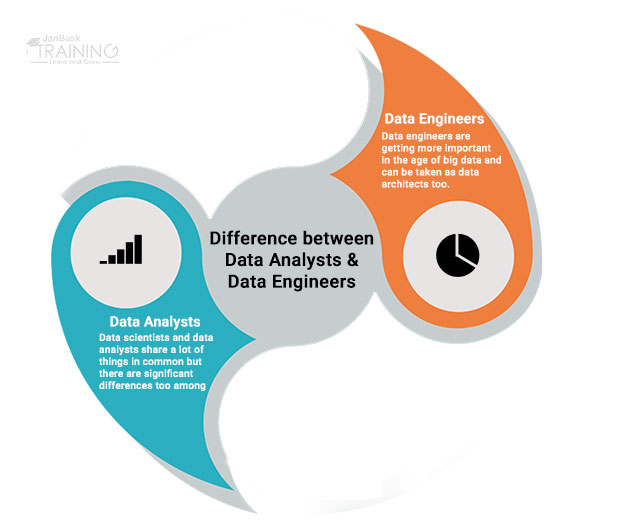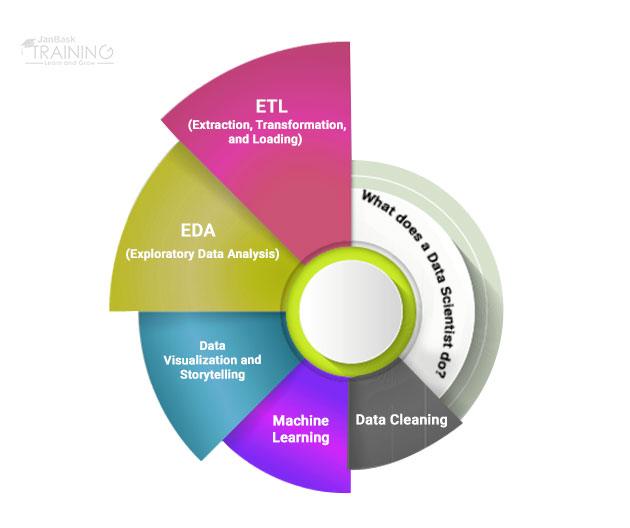16
JanNew Year Special : Get 30% OFF + $999 Study Material FREE - SCHEDULE CALL
The Harvard Business Review called Data Scientist “the sexiest job of the 21st century”. The New York Times also reported data success stories where people earn up to $100,000 on average as a data scientist. Today, software companies are not only the ones hiring data scientists, retail, healthcare, digital media, telecommunication industries too are signing on analytical thinkers and data scientist gigs.
It is projected that 50,000 GB of data will be created every second in the year 2019. It translates to 175,781 TB per hour and about 1.5 million Petabytes each year. Unfortunately, every byte of this data is not worth. So, you need to process the collected data well, analyze it, build data models to derive meaningful insights from voluminous data.
However, McKinsey predicted a shortage of 1.5 million data practitioners and managers in the US alone by 2019. Due to this high demand, it is labeled as the sexiest job of the 21st century by Harvard Business Review. Before we discuss on data science capabilities, let us learn what is data science exactly.
Data science domain is not new but it is 30 years old. Initially, computer science and data science terms were used interchangeably. In 2001, data science was made academic discipline that connects computer science with data. And data scientists are defined as information or computer experts, disciplinary experts, database or software programmers, and others who are curious about the successful management of digital data collections.
Data Science is the next big thing that every industry depends on to forge ahead. Simply, big data has become heartbeat today that no modern company or industry can survive without. And Data Scientists put life to the big data by translating it to the meaningful business insights. It is quite true that data science requires specific skillset including Maths, statistics, communications, design, forecast, analysis, engineering etc.
A data scientist is a data practitioner expected to have knowledge of scientific fields either little or more. Finding someone with all these skills is nearly impossible. So, how to find 1.5 million data scientists together? The best solution is to hire trained professionals who have completed data science certification program and gained enough hands-on expertize in different data science concepts.
Read: PCA - A Simple & Easy Approach for Dimensionality Reduction
This is a common question in the minds of the aspirants either they will be able to make a good scientist or not. To find out, ask yourself the following set of questions given below.
If you answered yes to most of these questions then you may find your profile suitable for the data scientist position. Data scientist requires a depth knowledge of statistics or Math. A natural curiosity and critical thinking are also important. Think of what can you do with the data? Find out what opportunities are hidden within data samples? You must have a zeal of connecting dots and find out answers to tough questions that have not been asked yet by analyzing data to its full potential.
According to a research report, more than 88 percent of data scientists have at least a master degree and 46 percent of them are Ph.D. scholars. Also, they need some background in computer science so that they can devise models or algorithms necessary to mine the stores of big data. Python or R programming skills may give added benefits here.
Most often, Data scientist role is confused with other similar roles like data analysts or data engineers. Let us learn the differences below how are they different?  Data Analysts
Data Analysts
Data scientists and data analysts share a lot of things in common but there are significant differences too among both profiles. Data analysts are not generally computer programmers and they don’t require knowledge of statistical modeling, machine learning, etc. The tools used by data scientists or data analysts are usually different. Usually, data analysts don’t have to interact with top management or business managers. They are given goals and questions, perform the analysis, and report their findings.
Data Engineers Data engineers are getting more important in the age of big data and can be taken as data architects too. They are not so much connected with statistics, modeling, analytics but more concerned about data architecture, data computing, data flow, data storage infrastructure and so on.
Read: Introduction of Decision Trees in Machine Learning
In the next section, we will discuss in detail about data scientist capabilities and what does a data scientist do exactly.
Data Scientists are engineers create data products that are used by human beings or machine for data. This explanation can be broken down into five major categories that Data scientists typically do on a daily basis. To give you a clear picture of these five tasks, let us discuss each of them one by one. 
ETL process involves data extraction from various sources, transforming data into the required format and loading it into end target after analysis. Data can be extracted from multiple sources including APIs, web scraping, or third-party vendors etc. The heterogeneous data is transformed in such a way that it can be loaded into data store on a Hadoop cluster and queried homogeneously.
Hadoop is scalable storage and batch data processing system used widely by Companies across many sectors. If you are preparing for the data science interview, there are huge chances that you will be evaluated for Hadoop skills and various technologies in its ecosystem. Apache Spark is another popular ETL tool that is high in demand these days. The usage of this tool is significantly higher and it is extremely fast with powerful easy to use development APIs that allow for efficient data streaming in machine learning or SQL workflows that use very huge datasets.
EDA is an important step in the data science cycle and purpose of EDA is to explore the data and to form a hypothesis that will guide your collection of new data or design of new experiments for further analysis. Basically, it will guide you to test your intuition about what you may find as you begin scratching the data surface in front of you.
Also, you can see data patterns, try different data modeling techniques, design experiments to get a better understanding of the data and come up with a better approach for continued data analysis. The best place to get started learning EDA techniques in Python is Joel Grus’ book or you can learn online. Today, online sites give thorough explanations of statistics and machine learning concepts, and easy to use code samples in Python.
It is a fact that not all data is useful for analysis. The biggest job of a data scientist is to clean data effectively and divide it into smaller chunks which are then mined for insights. Data is usually inconsistent, noisy, and incomplete in the real-world for analysis. This is one of the important steps that remove unnecessary duplicate data and make it suitable for analysis further.
Read: How To Write A Resume Of An Entry Level Data Scientist?
In Data Science, machine learning is one of the most important parts what data scientists do. Also, it differentiates data scientists from data analysts. Machine learning is a complex subject that requires a lot of efforts to master and incredibly powerful for deriving real-value out of the big data.
Have you ever wondered how Google ranks your website or Amazon recommends your favorite products on the Home page? It is all possible due to machine learning algorithms and data scientists are responsible to build or maintain them.
Data visualization is another critical piece in data scientist’s work. A well-designed infographic or dynamic visualization helps to derive meaningful insights quickly. They are considered an important part of the story or rule of thumb to present value of findings in such a way that is not possible to lay people in plain format. It attracts audiences towards your products or services and drives real business value in the end.
While there are many tutorials on the web to help you learn data visualization tools with examples, you are recommended to join data science training program to master everything practically in a short time span. Also, get the certification to get noticed by top recruiters worldwide.
There you have it five tasks that are performed by every data scientist on a regular basis. You need regular practice and proper training for getting better at each of them. Data scientists are highly passionate and curious to discover the best solution to a problem, ask relevant questions, and refine them into hypothesis to be tested until a valuable piece of insight is found. The world today and tomorrow is all about the data and data scientists are needed as trusted advisors to stay competitive in this ever-changing space.
Read: A Detailed & Easy Explanation of Smoothing Methods
 Pinterest
Pinterest
 Email
Email
The JanBask Training Team includes certified professionals and expert writers dedicated to helping learners navigate their career journeys in QA, Cybersecurity, Salesforce, and more. Each article is carefully researched and reviewed to ensure quality and relevance.

Cyber Security

QA

Salesforce

Business Analyst

MS SQL Server

Data Science

DevOps

Hadoop

Python

Artificial Intelligence

Machine Learning

Tableau
Search Posts
Related Posts
Receive Latest Materials and Offers on Data Science Course
Interviews